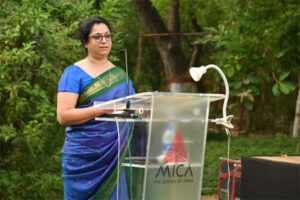- Sessions include mindfulness, well-being, expressive storytelling, and many more
- A panel discussion on ‘India Rising: Opportunities and Challenges’ will dissect the changing landscape of India’s rise, highlighting the interplay between opportunities and challenges that will shape the country’s future trajectory
- There are four things coming into our world: AI, synthetic biology, quantum computing, and robotics. These four things are going to change not just our work life but also our personal lives: Jaya Deshmukh, Director Designate of MIC.
NE EDUCATION BUREAU
AHMEDABAD, JUNE 10
MICA, Ahmedabad began its two-week orientation programme by welcoming 235 students across three programmes: MICA’s flagship Post-Graduate Programme (PGP – PGDMC and PGDM), Crafting Creative Communications (CCC) and Fellow Programme in Management (FPM).

Welcoming the new batch, Jaya Deshmukh, Director Designate of MICA, said, “There are four things coming into our world: AI, synthetic biology, quantum computing, and robotics. These four things are going to change not just our work life but also our personal lives. And to really understand what these four things are going to do, we need to be able to explain it. We need to be able to tell a really good story; that is where MICA comes in.”

“What you are going to learn in two years is to be fearless and how to go into ambiguity. I wish you two years of fearlessness, laughter, learning, and dreaming,” she said.
During the inauguration ceremony, MICA Dean, Prof. Githa Heggde said, “We are a unique school with a unique selection process and hence we are the differentiator. We not only look for analytical skills and divergent thinking but students who have a flair for problem-solving with creativity.”
The Dean, Prof. Githa Heggde, and the Registrar, Prof. Shubhra Gaur, introduced the entire MICA ecosystem to the new batch.

Addressing the new batch, the Chief Guest of the orientation inauguration Ramesh Ramadurai, Managing Director, 3M India, said, “AI is going to dramatically increase productivity and give employees the room for creativity. While there may be disruptions for people involved in repetitive tasks, I see a future where we will become extremely more productive than where we are today. It is hard to predict the changes, but you have to prepare for it by accepting that it will happen, and building the mental agility to embrace these changes will help.”
Delving more into the orientation design, the Co-chairs of the Orientation Committee, Prof. Mini Mathur and Prof. Saurabh Pandya said, “This year, we are setting the tone by introducing the element of discovery through orientation to the new MICA batches as they begin their academic journey. MICA values equity, diversity, inclusivity, and creativity, which is demonstrated through a variety of panels and workshops. Making meaningful connections with their batchmates, the MICA community, industry leaders, and alumni is possible through MICA orientation. This year, we have introduced a new session on expressive storytelling and creative movement and mindfulness and yoga sessions.
An evening of cultural engagement with the entire MICA community will mark the conclusion of Orientation 2024.”
The orientation programme 2024, spanning over two weeks, is designed to be an exciting mix ofengaging topics and activities. A power-packed orientation programme, beginning June 10, will include various sessions on Yoga, mindfulness, breathing techniques, expressive storytelling, design thinking, etc.
Two panel discussions titled ‘India Rising: Opportunities and Challenges’ and ‘Discussion on New Trends and Career Opportunities in Digital and Analytics’ will be held followed by an expert talk by titled ‘Marketing in the Tech-Enabled World: AI and Beyond’ by Mr. Anand Chakravarthy – Chief Growth Officer, Omnicom Media Group, India.
Detailing about the new workshop on expressive storytelling, Prof. Mathur said, “In this 2-hour intensive online workshop, students will learn about how movement can help change habituated responses and activate mind and heart for better thinking, perspective and energy. All of this will be done using the five elements of nature, group work and imagery.”












